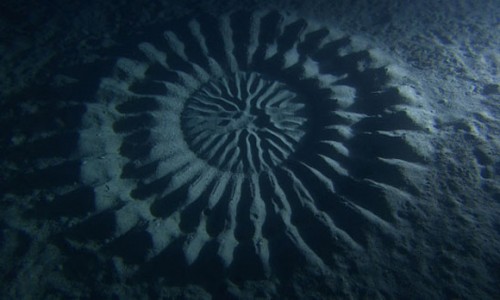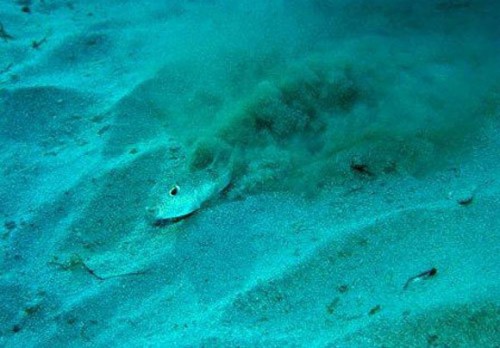Beneath the mysterious waters of the Sea of Japan, strange symbolic artworks have been spontaneously appearing — intricate mandalas, six feet in diameter, dot the sandy bottom. What could they mean?
Perhaps the aliens have been making these all along, at the same time they’ve been sending secret messages in crop circles. Perhaps they are manifestations of the Universal Consciousness, erupting into expressions of cosmic beauty. Maybe their meaning is their mystery, telling us to appreciate more what we do not know.
Nah, I don’t go for any of that mumbo-jumbo. Scientists put video cameras underwater, and caught the creator in the act. It’s this little puffer fish, a few inches long.
Using underwater cameras the team discovered the artist is a small puffer fish only a few inches in length that swims tirelessly through the day and night to create these vast organic sculptures using the gesture of a single fin. Through careful observation the team found the circles serve a variety of crucial ecological functions, the most important of which is to attract mates. Apparently the female fish are attracted to the hills and valleys within the sand and traverse them carefully to discover the male fish where the pair eventually lay eggs at the circle’s center, the grooves later acting as a natural buffer to ocean currents that protect the delicate offspring. Scientists also learned that the more ridges contained within the sculpture resulted in a much greater likelihood of the fish pairing.
I don’t believe in cosmic consciousness, but I do believe horny little animals will go to great lengths for sex.




You’ll be walking down the street thinking of a plate of fugu. And then you’ll see the words “plate”, or “fugu” or “plate of fugu”. There’s no explaining it, there’s no use trying, it’s all part of the cosmic unconsciousness.
Apologies to Emilio, and well, everyone else too.
And what is the reaction of potential predators to these structures? Do they even notice them, think it’s some large organism they shouldn’t mess with, or is it a giant “eat” sign?
On a side note, my hyperadaptationist spidey sense is tingling a bit at the mention of “the grooves later acting as a natural buffer to ocean currents that protect the delicate offspring.” I would say, if scientists only just recently figured what the hell was even doing this, any explanations as to its function have to be pretty speculative. All they can say for sure right now is that it plays a role in mating/reproduction, since the female comes and lays the eggs in the middle. As to whether it’s purely a sexual selection thing, or if it has other advantages for the eggs, I’d be pretty cautious.
Still pretty neat! :)
Damn, that is so cool. I figured ‘animal’ but had in mind tube worms or some other invertebrate. Didn’t imagine a fish. That may even outrank the bower bird.
> “…horny little animals will go to great lengths for sex.”
Ain’t it the truth.
Edit: Apologies to Tracey. Been a few years.
Why would they be hiding out of sight of the sensible skeptical eye yet at the same time they are leaving miraculous crop circles and ocean mandalas? Alas who are we to question the infinite mysteries of gods and cosmic ghouls.
Damned scientists, always figuring stuff out and shit.
Go little fishy, go!
Beautiful. I wish the architecturally stylish house always came before the whole reproduction bit. :)
In all seriousness, I’m once again amazed by the truly great lengths and the truly complicated ways that other organisms go about finding mates.
Three englishmen did this, with a piece of string, a board, and an aqualung.
Soon to be on u tube!
We were diving in Mammoth Lake last year when we came across two perfectly round, perfectly smooth, dinner plate sized shallow bowls near one of the sunken statues. Each one was surrounded by small pebbles and had a small fish right in the center. What was intresting was that the fish would not move out even if you reached out to try to touch them. We had to get within an inch or so before they would dart off.
First thing I thought of when I saw the above.
Either I had a cross-language deja-vu or I saw this on German public access TV ~20 years ago.
dammit harbo, I wanted to say that.
The research won’t stop the woo crowd. I can just hear the narration on one of those “Aliens are here/The cosmic powers are trying to warn humanity” type shows, the narrator talking about how scientists believe this is for mating purposes, but then saying that UFO “scientists” believe it’s such and such.
Obviously intelligent design. If it’s a none-too-bright fish with dreams of nookie dancing through its little fish brain, all the more intelligent design of that fish.
Because, um, that’s how it has to be, dammit.
Glen Davidson
I would’ve liked to have seen the wooist reaction to this before they set the cameras up, if there was one.
This is really cool. The natural world is so much more exciting, beautiful, fascinating and mysterious than any new age woo or religious superstition. Attributing interesting behaviour like this to the Universal Consciousness or God would actually cheapen the wonder for me.
I wonder if this behavior is akin to nest building in birds?
Riachardhart, #17:
I think it is, and BTW: many species of fish do make nests, quite similar to birds.
Never underestimate fish in terms of complexity of behaviour. More goes on in their little brains than some people might think.
Not fish, and not quite nests, but it’s also pretty interesting and entertaining to watch how fastidious Mantis and other shrimp can be about building, maintaining and improving their burrows.
Oh neat! I actually saw this behavior (swishing tails to move sand around) at the Shedd Aquarium. I just took my son there in July for his 5th birthday. Of course, there wasn’t enough sand in the tank to create any patterns, but the swishing action was clearly moving the sand around and exposing the rocks that were placed beneath the sand.
Dang, those puffer fish really know how to disguise the fact that they are aliens. Good job!
Jason, #20:
I would say that fish was deprived. The aquarium should give it more sand to work with, so that it can properly complete its ritual. Perhaps you should lobby the aquarium, send them a link to this page or something ;-)
Speaking of fish behaviours and aquaria, my favourite exhibit in an aquarium was a petting zoo with North Sea plaice in a shallow pool. All most Europeans know about plaice is that they are tasty when fried. But here you could really interact with them, put your hand in the water and they would swim up to you to be touched, or they would swim circles on the surface while slapping the water in a playful manner, or they would even swim toward someone and make a splash in their direction. Mischievous, cute, endearing and very popular with children and adults. The fish were clearly enjoying the attention. Made more than a few people think of perhaps not having fish & chips for a snack so unthinkingly.
some spiders make rather intricate webs for the purpose of collecting food and annoying campers, so it’s not much of a stretch to see a fish making that sand sculpture for the purpose of attracting mates. . . and freaking out the New-Agers.
I’m trying to spread the name “Zoid” for these structures, in deference to a certain Decapodian doctor who had a similar mating ritual.
Olav@24
Actually, as soon as I posted that, I sent Shedd the link via their general contact email and made a pitch for giving the fishies a bigger tank.
You know, darn it, the more I look at the design the more it looks like acoustic baffling. My question, is the female attracted to the sight, or perhaps, to the lack of reflected sound in certain critical frequency ranges?
You can’t explain that! Goddidit! Oh. Gee, it seems like there’s a moral to this story, but I can’t quite put my finger on it. Something about never assuming, or always investigate… nah screw it, I’ll just assume everything is magic until someone proves otherwise.
Spider webs were the comparison that occurred to me, too. Some spiders add decorations, of which the function is unclear.
Animal behaviors can be quite quirky, and they sometimes mirror some of the quirkiness of human behaviors.
Years ago I discovered that a pack rat lived in the old cabin that the folks had moved out of once the new house was built. They had left a lot of stuff behind, trinkets mostly. Coins, belt buckles, bullets, empty tins, cuff links and other cast offs. The pack rat had taken the notion to arrange the various bits into two piles on the floor.
I found it amusing that if I took one trinket from pile A and swapped it with one from pile B, I could come back the next day and find them swapped back. Put aright, so to speak.
I spent several weeks testing the wits of the little critter, even creating a new pile C one one occasion. To my delight, pile C proved popular and over the course of several days it grew at the expense of piles A and B.
It’s a pity that I never actually saw the pack rat moving items. That would have been amusing if not educational. I suppose that Space Reptiloids may have been involved but I never saw them either.
Fish are so cool. Natural explanations are way better than newage woo-woo.